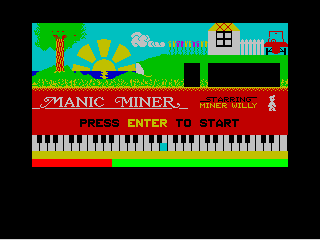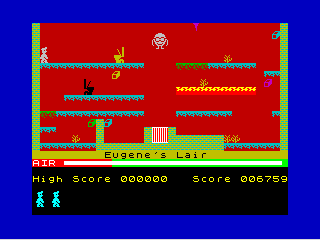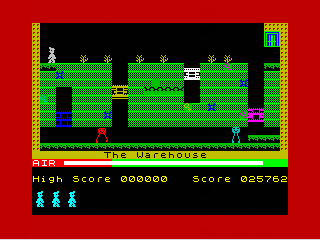Stop me if you've heard this one before. Our next whale is a mining-themed platformer by a programmer who previously sold ripoffs of classic arcade games for the TRS-80.
This time, though, the story is happening on the other side of the pond, where Londoner Matthew Smith's weapon of choice would be the iconically British ZX Spectrum rather than the all-American Atari. But his earliest game credit was, like Bill Hogue's, a TRS-80 arcade-style game.
Delta Tau One
It's just Galaxian. To be fair, it's a competent enough port. The system's limitations certainly show, but not nearly as much as you might think. The sound effects are even halfway decent considering the TRS-80 wasn't meant to have any sound at all. It plays much faster than the real thing, and hitting targets isn't nearly as difficult, but avoiding hits is much more so, especially from the kamikaze attacks once the fleet size drops to three or fewer.
The most radical thing here is hyperwarp option that jumps you ahead a number of levels. You have finite warps, but each can take you anywhere from 1-10 levels ahead - you just hit the corresponding digit key.
Overall it just isn't interesting enough to bother giving a number or GAB rating, so I didn't.
Delta Tau One sold a whole 15 copies through the Molimerx catalog, but got the attention of Liverpool software publisher Bug-Byte, who offered Smith a contract and a ZX Spectrum loaner.
Game 231: Styx
Smith's first game with Bug-Byte is an arcade-style game very obviously inspired by Wizard of Wor, but it isn't quite a knock-off.
The action of Styx occurs over three phases, each taking up one third of the screen's height.
First, there's a maze of spiders, and here the game most resembles Wor, and is also the most interesting. The design doesn't work terribly well, though. There are three maze sections, and the spider mother in the upper-right corner of the last section is the source of all spiders, so it doesn't matter very much how you go through the maze's first two sections; just do them quickly enough and you wouldn't need to worry about spiders until you reach the third. And when you do, because your laser gun can only fire horizontally, there's only one sensible path through the third section; going directly into the top row where you can fire a shot at the spider mother. Getting in without touching the spiders is a question of luck and timing.
There's one interesting detail - your lasergun has a limited power supply, but this isn't evident at first. Fire it too often, though, and you'll notice that its effective range gets shorter and shorter until it's completely useless. This certainly caught me off-guard until I realized what was going on.
Next there's a river infested with piranha. They never stop spawning, and dead ones respawn right where you need to be, so it may actually be wiser not to kill more than you need in order to slip through the school.
The final part is pretty trivial; a mass of spiders wriggle around in a space between you and the boatman Charon, but you can just snipe them from the safety of the brick antechamber to the arena. Then once their ranks are thin enough, you can just slip through them and shoot Charon in the face with a laser. Then the game repeats on a harder setting.
GAB rating: Below Average. Styx is mechanically fine, with responsive controls (even if the QAOP layout common to the Spectrum is a bit weird), fair hit detection, and avoids the attribute clash so common on the system. But it's a bit trivial and not very well designed.
Game 232: Manic Miner
Manic Miner was Smith's second game for Bug-Byte, made in eight weeks and released the same year as Styx, and is the first of his two whales.
Fifteen minutes of playing was all it took for me to realize my standard saving rules weren't going to get me through this with my sanity intact.
Controls are dead simple - you move left or right, and when you jump you have no control until you land. It's like Donkey Kong or Miner 2049er but without any ladders.
As early as the first level, the path through to collect all of the keys and unlock the exit is very narrow and unforgiving. The timing window for getting through any obstacle is harsh, and I got killed so many times by brushing up against something lethal. Getting through is all about memorization and perfect execution. And you've only got so many lives - maybe six if you're good about scoring points for bonus lives - to beat all 20 levels. I allowed myself a save every 10 minutes, knowing I'd probably need one on almost every level, as the loss of a life would be unacceptable unless very close to the end.
One cute detail - although the ingame music (a rarity on the system!) is pretty bad and I shut it off almost immediately, the icons representing your spare lives do this cute little dance when it's on, and stops when you turn it off.
After the first level, the next few ones were comparatively easy.
Another level "Eugene's Lair" challenges you to leap over walking toilets and time your movements to avoid a levitating humanoid egg.
Collect the last object and Eugene will start glowing, move toward the exit, and stay there. So save the closest one for last.
Levels get progressively harder. Some reference certain popular video games.
And current events.
That one's pretty unfair with stuff crashing down without warning faster than you can react, sometimes even mid-jump. There's a few breather levels after, but then it gets even more ridiculous.
The Warehouse's disintegrating platforms mean you can't stand still, but the bear traps and other hazards mean you need to time your movements perfectly, which is no small task when you can't stand around and wait. It's quite easy to accidentally have Willy jump vertically instead of horizontally - it's not enough to press a direction, but you have to hold it just long enough for him to move at least a pixel before you press a jump key - and the number of times I screwed things up because of this alone is crazy.
The amoebatrons in Amoebatrons' Revenge aren't so bad. The bad part is jumping over the minecarts without bumping into one above, especially the green one above the fast purple one. I had a bad time here until I realized it's possible to stand just to the right of the purple one's range and wait for an opening, and even then, reaching that part was pretty difficult.
The Solar Power Generator is a special kind of hell. Right off the bat these colors give me a headache, and thanks to my colorblindness I can barely see the gold (are they gold?) objects moving over the green background. So many jumps here require absolutely pixel-perfect timing - I'm talking with your heels barely touching the edge of the platform before you jump off it it - and on top of that, touching the reflecting light beam drains your air supply fast.
The hardest part here is getting back up from the ground after getting the lower key, but if you go for the bottom key first, then you'll waste time you don't have, as getting the key on the upper-left section will force you down to the bottom floor anyway, forcing you to make the tricky set of jumps back up to the platforms once again.
The last level isn't too bad - it's tricky, but not even close to the extreme difficulty we've seen before. First, avoid the hopper without hitting the spiders by jumping vertically as it passes under you, grabbing the keys above. The timing is strict but it's doable. Then hop on the conveyor belt at the right time so that by the time you reach the end of it you can jump over the floating eyeball - this may require some trial and error, but the timing window is generous. Then get the key, loop back, and exit, to find out that the password is.. fish sword?
After that, you're back on the first level. I don't know if the difficulty increases, but I don't really care.
GAB rating: Below Average. I did not enjoy Manic Miner. It invites comparison to Miner 2049er, a game that I found enjoyable but was hurt by excessively unforgiving difficulty. Manic Miner plays more slowly, controls more stiffly, looks uglier (and sounds ghastly), has less interesting levels, and is so much more unforgiving that it became a chore to play even with my lax rules on save states. I can't imagine trying to beat it honestly, where running out of lives means restarting from the first level.
Miner Willy will return for the 1984 phase of Data Driven Gamer, but my next game's going to go back a little further in time, as there's a particularly crucial genre-defining predecessor that I previously skipped.




















0 Yorumlar